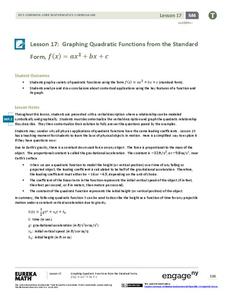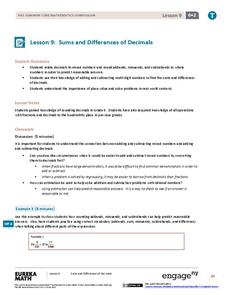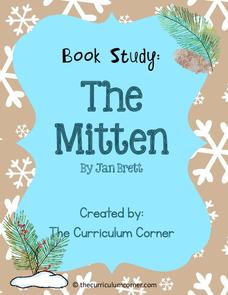ReadWriteThink
Persuasive Techniques in Advertising
Help your 21st century learners develop their media smarts with this resource that has them examine the persuasive techniques advertisers use to influence specific demographics and then to use these techniques to craft their own ads.
The New York Times
Dark Materials: Reflecting on Dystopian Themes in Young Adult Literature
The Hunger Games. Maximum Ride. Why is so much of young adult literature so dark? What is the appeal of dystopian literature to young readers? The six activities in this resource ask kids to reflect on some of the reasons this genre has...
EngageNY
Graphing Quadratic Functions from the Standard Form
Use context to explain the importance of the key features of a graph. When context is introduced, the domain and range have meaning, which enhances understanding. Pupils use application questions to explore the key features of the graph...
Balanced Assessment
The Contest
Good advertisers can make mathematics seem irrelevant. Teach your classes to use math to see through these tactics and make good decisions. The posed task has pupils analyze sweepstakes statistics to determine and compare the cost of...
EngageNY
Nature of Solutions of a System of Linear Equations
If at first you cannot graph, substitute. The lesson introduces the substitution method as a way to solve linear systems if the point of intersection is hard to determine from a graph. The 28th installment of a 33-part series finishes...
PBL Pathways
Medical Insurance
Design a plan for finding the best health insurance for your money. Learners compare two health plans by writing and graphing piecewise functions representing the plan rules. Using Excel software, they create a technical report...
EngageNY
Sums and Differences of Decimals
Sometimes dealing with decimals is so much easier than dealing with fractions. The ninth lesson in a 21-part module has the class consider situations when it might be easier to add or subtract fractions by first converting to...
John F. Kennedy Presidential Library & Museum
Red States/Blue States: Mapping the Presidential Election
Young historians investigate how voting patterns have changed by comparing the outcome of the 1960 election to the outcome of the recent election. A creative final assessment has participants making a news show wherein they provide...
EngageNY
Describing Distributions Using the Mean and MAD
What city has the most consistent temperatures? Pupils use the mean and mean absolute deviation to describe various data sets including the average temperature in several cities. The 10th instructional activity in the 22-part series asks...
101 Questions
Gas Light
You don't want to leave any learners stranded! Explore ratios using an analysis of gas mileage and distance. Given a scenario, individuals must determine if a car has enough gas to make it to the next gas stop.
Utah Education Network (UEN)
8th Grade Poetry: Sonnet Poem
The third instructional activity of five in an eighth-grade poetry unit has young scholars comparing Shakespearean sonnets with Petrarchan sonnets. To begin, they examine the different structures of the two forms and their different...
Hello-Hello
Portuguese – Learn Portuguese
Marcos and Paulo have just met Ana. Watch as they use Portuguese to introduce themselves and get to know each other. Language learners then complete a series of activities designed to help them master each brief conversation.
Global Oneness Project
Ancient and Modern Worlds
The old aphorism, "The road to Hell is paved with good intentions," might well serve as the title for a resource that asks viewers to consider the plight of the people of the Gamo Highlands, an area in southwestern Ethiopia. These...
Bowland
Cats and Kittens
Can a cat have 2,000 descendants in 18 months? To determine if this claim is realistic, individuals must take different pieces of information into account when justifying their responses.
CK-12 Foundation
Electric Ice Sheet
Tommy is trapped on an ice bridge and needs you to balance the charges so he doesn't fall into the icy water! Scholars apply Coulomb's Law, which relates to both the strength and the distance between charges. They work with these two...
Curriculum Corner
Book Study: The Mitten
Looking for a set of resources to compliment a reading of The Mitten by Jan Brett? A fun winter resource has everything from story sequencing and writing prompts to a parts of speech sort and a mitten flap book. The activities are great...
Curriculum Corner
Coniferous and Deciduous Trees
What are the differences between coniferous and deciduous trees? Supplement your tree lessons with a set of activities that has learners describing, naming, comparing, and reading about deciduous and coniferous trees. The activities are...
National Nanotechnology Infrastructure Network
Lines on Paper - Laser Box
See what you cannot see by getting a little creative. An intriguing lesson has learners use lasers to explore X-ray diffraction. Given a box with unknown structures, they shine a laser through the box and interpret the results....
Curated OER
Paragraph Structure
Make sure your writers have the buns and the meat in their paragraph burgers with paragraph exercises. The resource gradually leads up to individuals writing their own paragraphs, starting with identification exercises, moving on to...
Council for Economic Education
Balance of Payments (BOP)
Have you ever checked your clothes to see how many nations created them? Pupils take a deeper look at international trade and the balance of payments nations have with one another. They use calculations, simulations, and primary sources...
Texas State Energy Conservation Office
Investigation: Water Wheel
Middle school scientists construct a working water wheel from an aluminum pie pan. Because of the sharp edges on the cut aluminum, this activity is for mature learners only. You could have your class compete to see whose wheel can lift...
PBS
Arthur’s World Neighborhood: Bibliography for Kids
Support young learners as they expand their cultural awareness with this list of children's literature on countries from around the globe. Including both fictional and non-fictional texts. This resource will help...
Busch Gardens
Create an Invertebrate
What better way for young biologists to learn about invertebrates than by creating their very own? Here, students are assigned a set of invertebrate characteristics and are asked to invent an imaginary ocean animal...
Vita Education Services
Past Continuous Game
Your pupils were studying the past continuous when you realized that they could benefit from this game! Learners roll a die and complete the sentence they land on. They will have a chance to begin and end sentences.
Other popular searches
- 1st Grade Grammar Has/have
- Helping Verbs Have Has
- I Have Who Has
- Have and Has
- I Have Who Has Game
- Using Has and Have
- Have To/has To
- Verbs Has and Have
- Have Got Has Got
- Have Has Had
- Language Has and Have
- Have Got /Has Got























